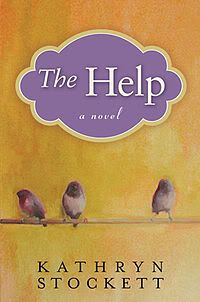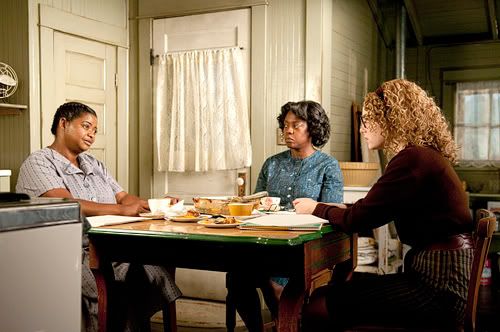Currently Reading: The Rebels of Ireland by Edward Rutherford
I heard an NPR story the other day that has really gotten me thinking and I cannot come up with an answer that satisfies me. The topic of discussion was The Help by Kathryn Stockett, a very popular book that is now receiving extra buzz since the movie adaptation has been nominated for several Oscars. If you haven’t read the book or seen the movie, then all you need to know is that it is about a white woman who secretly interviews black maids in 1960s Mississippi and writes a book about their experiences. This becomes a very dangerous project for the women involved; the black maids are literally putting their jobs and lives on the line to do this. The author of the book, Kathryn Stockett, is a white woman who grew up in the South; she has stated in interviews that the idea for the novel came from growing up with a black maid and realizing she loved her but never really knew her. The title of the NPR segment on Here & Now was “When Black Stories Are Written by White People”; in addition to The Help, they also discussed the play “Porgy and Bess” and the show “The Wire”. Renee Graham, the Here & Now pop culture critic, talked about her reactions to the book and movie as an African-American woman whose grandmother was a black maid. This is not the first NPR discussion I’ve heard of the book and as always, I listened intently because I find it very interesting to hear the reactions and perceptions books elicit in their readers. Graham had a lot to say about the movie and the book, most of it negative. Some of her main issues with it included: the fact that a story about black women still had to include a white protagonist, the poorly written “black vernacular," and the stereotypical portrayals of black women. Many of these comments I agree with, having read the book and seen the movie. Yet I was completely struck by one comment Graham made, which I will quote directly here. Although, as Graham says, Stockett grew up with a black maid in the South, “What makes you [Stockett] think you can now sit and write this book in the voice of these black maids?”
There are several ways of looking at this comment. One could say it is truth. Capturing a voice and portraying a character is difficult, but doing so when one is not from that “group” might be presumptuous and could lead to stereotyping or misrepresentation. I loved The Help, but this does occur, especially in the movie. However, one could say that Graham’s comment is a bit racist- that Stockett had no right to write a book about another race. My mind started spinning after this comment. Who or what then determines what a writer is “allowed” to write or not? Are there limits on what a writer can write? I have been unable to get this discussion out of my head. So is Graham right?
I am left straddling the fence, uncertain which side appeals to me more. On one hand, as Friedrich Behr tells Jo March, a book is most successful when you write what you know. Dickens’ and Conan Doyle’s London is so believable because they lived and breathed the grimy air amid personages they fancifully recreated in their books; Mark Twain knew that Mississippi River and the people along it like the back of his hand. Geraldine Brooks’ People of the Book is so realistic because she was actually a journalist in Bosnia during the years in which she sets the novel. Experience is the key that makes a novel more authentic and real for its readers.
The other side of the fence reads like this: If we only wrote about what we were intimately acquainted with, then wouldn’t there be a lot less books in the world? Historical or fantasy novels would cease to exist; narration would only be in first-person. I cannot fathom anything more stifling to the imagination than the argument that one should only write about what they are familiar with. If we take this a step further, then does this mean that because I am a woman, I cannot create a character who is a male? Because I am an American, I cannot construct a novel set in Ireland? Because I live in 2012, I cannot write a story set in 1774? Of course, I am exaggerating Graham’s point, but when explored further, the argument starts to sound ludicrous.
All in all, I can settle on several key points. Race is a delicate topic and the civil rights era is especially contentious, since it occurred within recent memory and is still fresh for many people. Therefore, I agree that one must tread lightly when discussing its presence, effect, and portrayal in literature. Another key point that I rest firmly on is historical detail in movies and books; as a lover of history, I wholeheartedly agree that any historical discrepancies take away from the value and power of a book like The Help. Yet I find myself thinking that no matter what one’s perception of The Help, the point is that it has gotten us talking. The book revealed an era and a way of life that are unknown to many Americans and quite possibly induced people to learn more about the real history behind it. As evidenced by the NPR show and even this post, the book has already become a stepping stone to further conversations about race and responsibility, as well as exploring the civil rights movement and analyzing how much farther our society still needs to come. For better or for worse, it has started a discussion that I have a feeling will not go away anytime soon. And after all, isn’t that the point of literature? Whether you like it or hate it, a truly good book is one that starts a conversation. It may change perspectives, teach lessons, and open eyes to the realities outside the fictional story, or it might not. But I have to admit, I love open-ended discussions like these. And I am still not finished pondering it.... I’ll have to keep mulling it over for a few days. What is your opinion? I would love to hear it.


An interesting thought. I have not read (or seen) "The Help," but I still understand your reasoning. In my American literature class, we just finished reading and discussing the Uncle Remus stories by Joel Chandler Harris, an Irishman who was born in Georgia.
ReplyDeleteIf he had not spent his early adulthood living and working at a plantation, would he have been able to construct the slave dialect of the time? Some criticized his work and the stereotypes presented, but others (especially Mark Twain) were heavily influenced by it. In fact, one could say it was one of the first influential works by an American writing in another dialect to convey character.
The books were widely read and loved by whites and blacks living in the north and south. That opened up many avenues of discussions. In that, then, by your definition, is a truly good book.
I am inclined to disagree with Graham's point, but I still see the merit. However, that does not stop me from writing stories set in Victorian, Civil War, World War II, or any other time period as I desire.